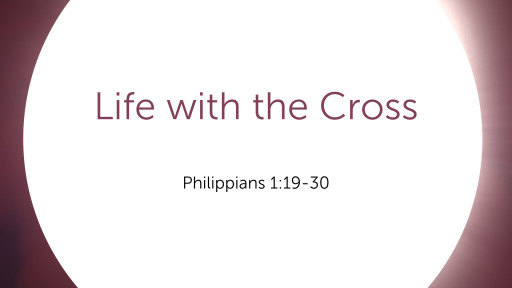Life with the Cross

Introduction
(FTLN 1762) [64] To be or not to be—that is the question:
(FTLN 1763) [65] Whether ’tis nobler in the mind to suffer
(FTLN 1764) [66] The slings and arrows of outrageous fortune,
(FTLN 1765) [67] Or to take arms against a sea of troubles
(FTLN 1766) [68] And, by opposing, end them. To die, to sleep—
(FTLN 1767) [69] No more—and by a sleep to say we end
(FTLN 1768) [70] The heartache and the thousand natural shocks
(FTLN 1769) [71] That flesh is heir to—’tis a consummation
(FTLN 1770) [72] Devoutly to be wished. To die, to sleep—
(FTLN 1771) [73] To sleep, perchance to dream. Ay, there’s the rub,
(FTLN 1772) [74] For in that sleep of death what dreams may come,
(FTLN 1773) [75] When we have shuffled off this mortal coil,
(FTLN 1774) [76] Must give us pause. There’s the respect
(FTLN 1775) [77] That makes calamity of so long life.
Philippians 1:19-30
To Live is Christ
Worthy of the Gospel
“Only let your conduct be,” or as the RSV has it, “let your manner of life be,” is a translation of a single word, politeuomai. By derivation it means “to exercise the rights and duties of a citizen.” Paul was saying, “Live your citizen-life.” You are a Christian; your citizenship is in heaven (see Phil. 3:20). The Philippians could easily identify with Paul’s image. Philippi was a colony of the Roman empire. Every Roman colony was a little of Rome planted in distant settings throughout the world. A Roman citizen, no matter where he was, never forgot that he was a Roman. So the Philippian Christian understood Paul’s word. There are common principles and actions that are to characterize our life as citizens of the kingdom.
The Privilege of Suffering
It is natural, then—inevitable—that those who believe are also given the privilege of suffering. They are conformed to the One in whom they believe, and that is the theme of the next chapter.
